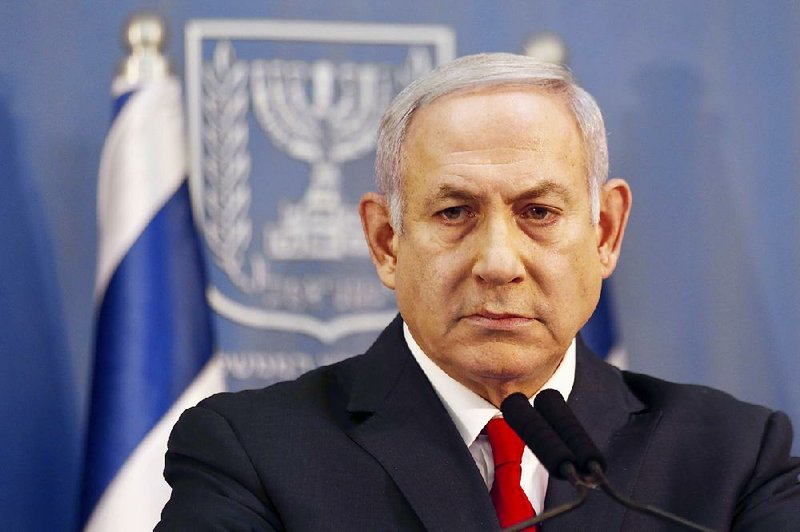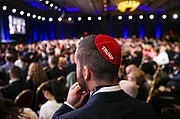JERUSALEM -- Israeli Prime Minister Benjamin Netanyahu pledged Saturday to annex Jewish settlements in the occupied West Bank if re-elected, a policy shift apparently aimed at rallying his nationalist base in the final stretch of the tight race.
Separately, President Donald Trump said Saturday that a Democratic victory in 2020 could "leave Israel out there," as he highlighted his pro-Israel actions in an effort to make the case for Jewish voters to back his own re-election.
Netanyahu has promoted Jewish settlement expansion in his four terms as prime minister, but until now he refrained from presenting a detailed vision for the West Bank, seen by the Palestinians as the heartland of a future state.
A so-called two-state solution has long been the preferred option of most of the international community. However, intermittent U.S. mediation between Israelis and Palestinians ran aground after Trump recognized Jerusalem as Israel's capital early in his term. The Palestinians, who seek Israeli-annexed east Jerusalem as their capital, suspended contact with the U.S.
More recently, Trump recognized Israeli sovereignty over the Golan Heights, a plateau Israel captured from Syria in 1967. The move was viewed in Israel as a political gift by Trump to Netanyahu, who is being challenged by former military chief Benny Gantz.
The U.S. State Department declined to comment on Netanyahu's statement.
On Saturday, Netanyahu gave an interview to Israel's Channel 12 TV at the top of the prime-time newscast. Netanyahu portrayed the U.S. policy shifts on Jerusalem and the Golan Heights as his achievements, saying he had persuaded Trump to take these steps.
Netanyahu pledged that he would not dismantle a single Jewish settlement and that Israel would retain control of the territory west of the Jordan River -- the West Bank. More than 600,000 Israelis now live on war-won lands, two-thirds in the West Bank.
The interviewer asked why he hadn't annexed some of the larger settlements during his current term. "The question you are asking is an interesting question, whether we will move to the next stage and the answer is yes," he said, adding that the next term in office would be fateful. "We will move to the next stage, the imposing of Israeli sovereignty."
"I will impose sovereignty, but I will not distinguish between settlement blocs and isolated settlements," he said. "From my perspective, any point of settlement is Israeli, and we have responsibility, as the Israeli government. I will not uproot anyone, and I will not transfer sovereignty to the Palestinians."
In any partition deal, the more isolated Jewish settlements would likely have to be uprooted to create a viable Palestinian state.
Saeb Erekat, a veteran former Palestinian negotiator, said he held the international community, especially the Trump administration, responsible for Israel's policies.
"Israel will continue to brazenly violate international law for as long as the international community will continue to reward Israel with impunity, particularly with the Trump administration's support and endorsement of Israel's violation of the national and human rights of the people of Palestine," he said in a statement.
COURTING JEWISH VOTERS
Speaking Saturday at the annual meeting of the Republican Jewish Coalition in Las Vegas, Trump touted his precedent-shredding actions to move the U.S. Embassy to Jerusalem from Tel Aviv and recognition last month of Israeli sovereignty over the disputed Golan Heights, a strategic plateau that Israel seized from Syria in 1967.
"We got you something that you wanted," Trump said of the embassy move, adding, "Unlike other presidents, I keep my promises."
The group, backed by GOP megadonor Sheldon Adelson, supported Trump's 2016 campaign and is preparing to spend millions on his 2020 effort.
"I know that the Republican Jewish Coalition will help lead our party to another historic victory," Trump said. "We need more Republicans. Let's go, so we can win everything."
Jewish voters in the U.S. have traditionally sided heavily with Democrats, but Republicans are hoping to narrow the gap next year.
Trump earned standing ovations for recounting both the embassy move and the Golan Heights recognition.
Trump also took credit for eliminating hundreds of millions of dollars in aid to the Palestinians and for pulling the U.S. out of several U.N. organizations, the U.N. Human Rights Council and UNESCO, citing anti-Israel bias in their agendas.
Trump criticized some 2020 Democrats who have suggested they would re-enter the 2015 Iran nuclear deal, from which Trump withdrew the United States. The agreement was fiercely opposed by Netanyahu, who has cheered as Trump reimposed stringent new sanctions on the country that Israel regards as an existential threat.
Trump predicted in his speech Saturday that the Israeli election is "gonna be close," adding it features "Two good people," seemingly referring to Netanyahu and Gantz.
Despite his criticism of Democrats, Trump has faced his own criticism from the Jewish community. Trump was slow to condemn white supremacists who marched violently in Charlottesville, Va., in 2017. The previous year, he circulated an image of a six-pointed star alongside a photo of Hillary Clinton, a pile of money and the words "most corrupt candidate ever."
When he addressed the Republican Jewish Coalition in 2015 he said he didn't expect to earn members' support because he wouldn't take their money. "You want to control your politicians, that's fine," Trump said at the time. Ultimately, the group and many of its donors backed Trump.
Trump's speech comes weeks after he suggested Democrats "hate" Jews. His remark followed an internal fight among Democrats over how to respond to comments by Rep. Ilhan Omar, D-Minn., that some criticized as anti-Semitic.
He also accused Democrats of allowing anti-Semitism to "take root" in their party.
Separately, the White House on Saturday issued a statement claiming the entire slate of Democratic presidential candidates has failed to adequately condemn anti-Semitism and consistently rejected the need to protect Israel.
The statement issued by White House spokesman Hogan Gidley comes after Democratic presidential candidate Beto O'Rourke compared the rhetoric used by Trump to describe migrants to the rhetoric used in Nazi Germany.
O'Rourke made the comments during multiple campaign stops Thursday in Iowa. The White House did not respond to a request for comment at the time.
THE TRUMP FACTOR
Trump isn't on the ballot for Israel's national election, yet he's a dominant factor for many American Jews as they assess the high stakes of Tuesday's balloting.
In his battle for political survival, Netanyahu has aligned closely with Trump -- a troubling tactic for the American Jewish voters who lean Democratic.
"The world has come to understand that Netanyahu is essentially the political twin of Donald Trump," said Jeremy Ben-Ami, president of the liberal pro-Israel group J Street. "Unlike his previous elections, there is a much deeper antagonism toward Netanyahu because of that close affiliation between him and Trump and the Republican Party."
Netanyahu featured Trump in a recent campaign video, while Trump has made a series of policy moves viewed as strengthening Netanyahu in the eyes of Israeli voters.
"It's troubling," said Halie Soifer, executive director of the Jewish Democratic Council of America. "The U.S.-Israel relationship should not be about any two leaders or any two parties. The American Jewish community wants the relationship to remain on a bipartisan basis."
Among liberal and centrist American Jews, dismay with Netanyahu extends beyond his alliance with Trump. Some say he's been too harsh in his treatment of migrants, and they bemoan his backtracking on a promise to allow mixed-gender prayer at the Western Wall.
Netanyahu's alliance with an ultranationalist political party linked to a movement previously banned for anti-Arab bias and incitement was assailed as "repugnant" by Eric Yoffie, a rabbi from Westfield, N.J., in a March 27 op-ed in the Israeli newspaper Haaretz. Yoffie also decried Netanyahu's "excessive enthusiasm" for Trump.
"Cordial relations are essential," wrote Yoffie, president emeritus of the Union for Reform Judaism. "But the sycophantic buddy movie that Bibi has produced with America's unbalanced and unpredictable president is something else altogether ... Bibi's egregious and unnecessary embrace of everything Trump will cost Israel dearly."
American Jews who dislike Netanyahu view Gantz as preferable, partly because of a less combative personality, but liberals note with frustration that the platform of Gantz's Blue and White party makes no mention of Palestinian statehood, and says that Israel will maintain control of parts of the West Bank..
Emily Mayer of IfNotNow, a group of young American Jewish activists opposed to Israel's treatment of Palestinians, is dismayed at how that issue has been marginalized in the Israeli election campaign.
"Regardless of the winner, the utter erasure of Palestinian humanity from this election cycle and the normalization of an undemocratic and immoral military occupation should alarm any Jew who cares about freedom and dignity of Israelis and Palestinians," Mayer said in an email.
Information for this article was contributed by Karin Laub, Matthew Lee, David Crary, Josef Federman, Zeke Miller, Michelle L. Price and Alexandra Jaffe of The Associated Press.
A Section on 04/07/2019

